The 600.
When a pop science symposium takes place in Bulgaria’s premiere, state-of-the-art convention hall— when past speakers include bestselling authors and actual scientists talking about their own cutting-edge research— and when they ask you to give a talk on a profoundly difficult branch of science in which you have no formal expertise whatsoever— it’s reasonable to assume, right off the bat, that the invitation is meant in jest. When it turns out to be real, it’s reasonable to wonder if the whole thing isn’t some kind of cruel hoax.
This is the attitude with which I approached last month’s trip to Sofia, to give a talk at something called “Ratio“. I didn’t know what shadowy cabal lurked behind these Bulgarian TED talks, or why they had painted a bullseye on my back. I knew it was most likely a trap, but I’d been published in Bulgaria. I had readers there. It was a risk I had to take.
Turns out, though, this annual symposium with the high-end production values is basically a hobby: the part-time brainchild of a couple of people with day jobs, who one day just decided that Bulgaria needed a popular science event and set out to make it happen. Lubo Baburov runs an online shopping site; Vassy Valchanova is in Marketing and loves cats. For shadowy evil masterminds they both turned out to be pretty awesome.
Their many minions, far as I can tell, put the whole thing together out of the sheer love of science; at least, they don’t get paid anything. Ratio’s numerous corporate sponsors presumably get some kind of positive PR out of their contributions, but why shouldn’t they? It’s a damn good cause. Hey, they paid my way.
Put it all together, and you get a day-long event run so proficiently, so glitch-free, that it puts to shame most of the professional conferences I’ve attended.
The days leading up to this event, mind you, were not entirely without incident. I spent most of one day on interviews which ranged from smooth and free-wheeling to, well, dissonant. (Try going on live radio when, due to time constraints, the translator at your side is turning your words into Bulgarian at the same time you’re speaking them in English. I dare you to deliver focused and cogent responses in the presence of simultaneous dubbing.) And there was this other interview with a different translator— for an outlet that was only ever described to me as “Socialist NPR”— whose first question was “Tell us, what is your favoured theory for the origin of life on this planet?”
It was not a question I’ve ever been asked before. I certainly wasn’t expecting it. I did my best: talked about my fondness for the “catalytic clay” model, where tiny vacuoles in the clays around hydrothermal vents provided convenient sticky surfaces for the accumulation of the organic molecules that precipitated from this mineral-rich, energy-dense environment, concentrating and containing them so they could interact in biologically-significant ways even in the absence of cellular membranes. I mentioned the whole RNA-World thing, pointed out how certain brands of RNA could act both as catalysts for those reactions and as replicators in their own right.
They smiled and nodded and spoke among themselves, jotting down my words on a yellow notepad. I thought it had gone pretty well until they’d departed, at which point Lubo rolled his eyes and told me that my answer had been translated as: “Magic crystals in the deep sea are awakened by energy.”
I met my Bulgarian publishers, who— judging by their choice of authors— are obviously in the business more for love than for money. I hung out at a retro Soviet-era Space Age restaurant where you have to sit on a swing to use the toilet. I snapped pictures of many strange and dystopian monuments, ranging from brutalist Soviet-era kitsch to artefacts that have obviously leaked across the dimensional boundary from some parallel timeline. I got briefly swept up in Sofia’s Pride Parade en route to dinner, reveled vaguely in the obvious feel-good ambiance of the thing, and then— the next day— discovered a note someone had sent me on Facebook Messenger two days before, mentioning that the local LGBT community faced a fair bit of hostility and wondering if I might want to informally join the parade. (I would have, too— for longer than those happenstance five minutes— if I’d seen the message in time. For future reference: my presence on facebook is reluctant at best, and I utterly loathe Messenger. Anyone trying to get in touch with me would be better off sending smoke signals.)
I spent much of each day sampling the local beerage and having eighteen different varieties of pork shoved endlessly down my gullet. (Anywhere else on the planet the term “pork bacon” would be redundant; in Bulgaria, it’s a high-level classification roughly equivalent to “phylum”.)
The rest of the time I anxiously went over my notes and hoped I wouldn’t go down in flames. After all, the guys scheduled to speak right after me were real neuroscientists. Plus my talk was half-recycled; a chunk of the previous month’s Pyrkon lecture stapled onto some late-breaking headlines, a couple of new modules, and a change of focus for a different audience. I was worried that someone from Poznan might have made it down to Sofia (Europe’s small, right? Traveling from Poland to Bulgaria is like taking a bus across the GTA); half-convinced they’d start booing when they realized they’d made the trip for the same old slides.
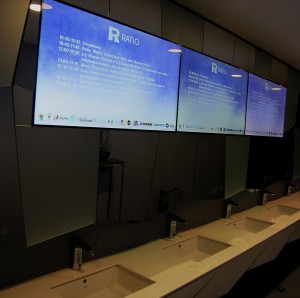
You literally couldn’t take a dump without seeing my name. (Well, you could, but only if you didn’t wash your hands afterward.)
It was for this explicit reason I’d arranged to spend most of my time in Bulgaria before Ratio. If I crashed and burned, at least I wouldn’t have to hang around to face the music. I’d be out of there on the next flight.
As it turned out, though, it went pretty well. Over six hundred people in the audience and not a single catcall; in fact, people seemed to like it a lot. Made some awesome new contacts, including a corporate lawyer who specializes in contract law, and who is now on my List Of Pesterable Experts. I even got to talk about Westworld during the group Q&A at day’s end.
Really, I wasted a perfectly good ulcer. I’d even do it again.
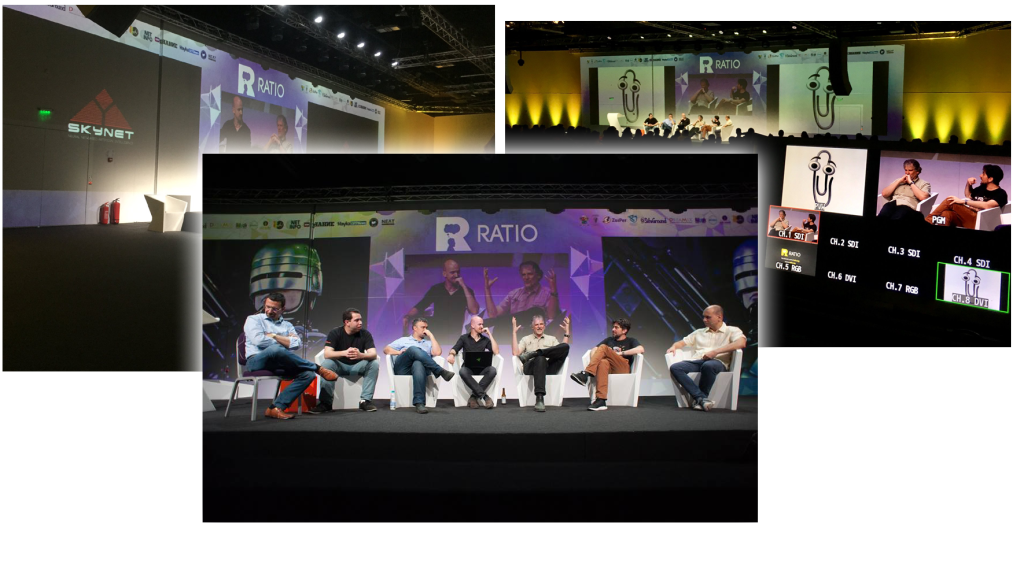
The day’s speakers shared the stage for an overall Q&A at the end of the day. Emil Wagenstein was responsible for coming up with context-appropriate background slides on the fly. I honestly don’t know how he did it in real-time, without knowing where the conversation was even going. Once I started talking about LSD and he threw a couple of sixties-era hippies up on the screen. Took him about two seconds.

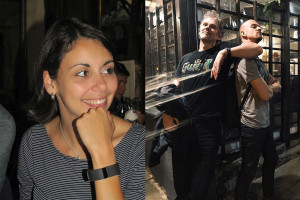
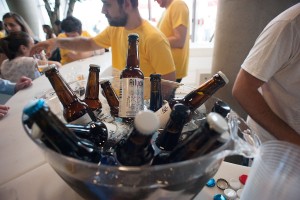
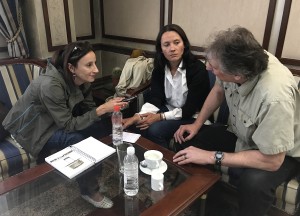
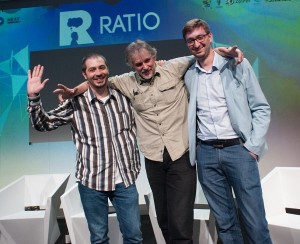
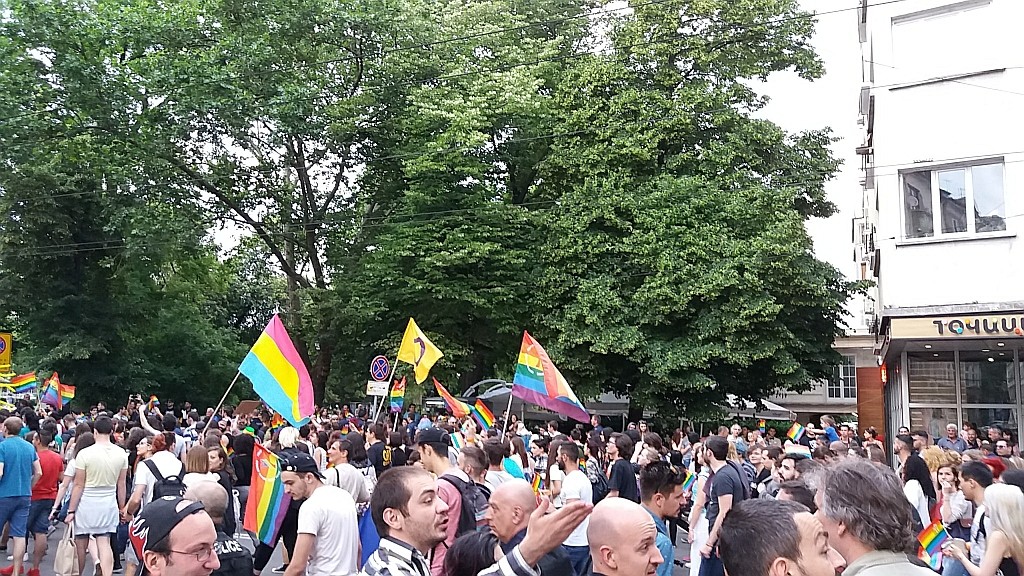
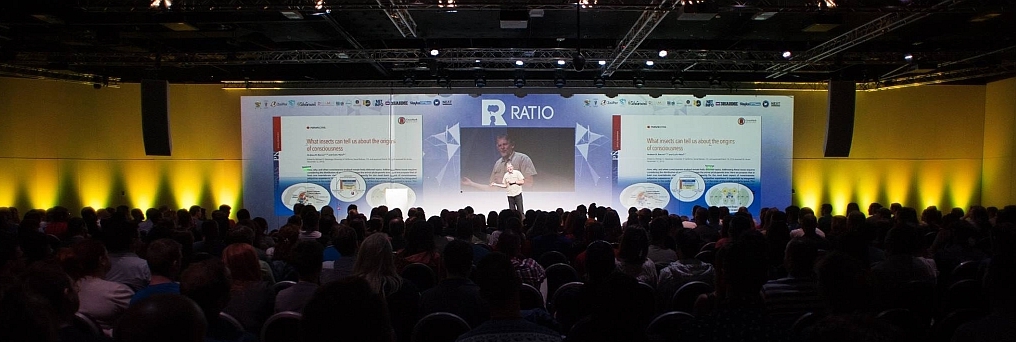
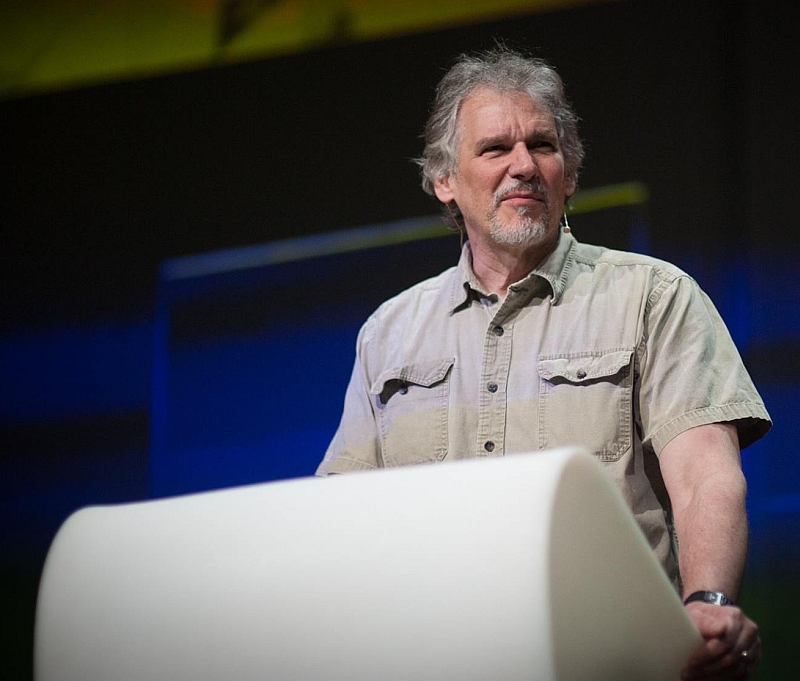
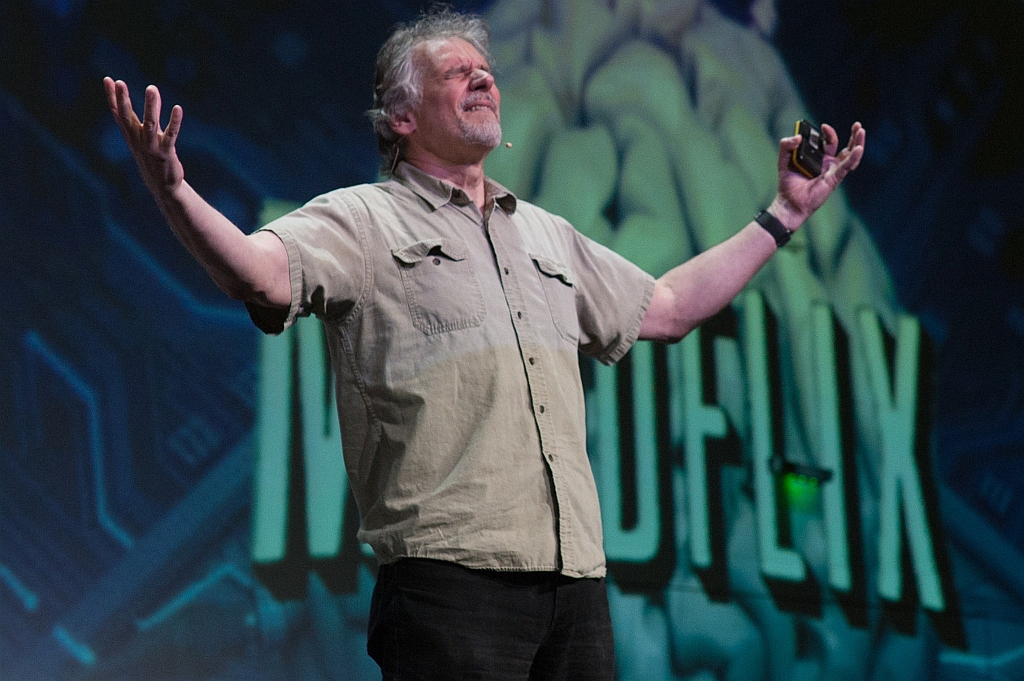
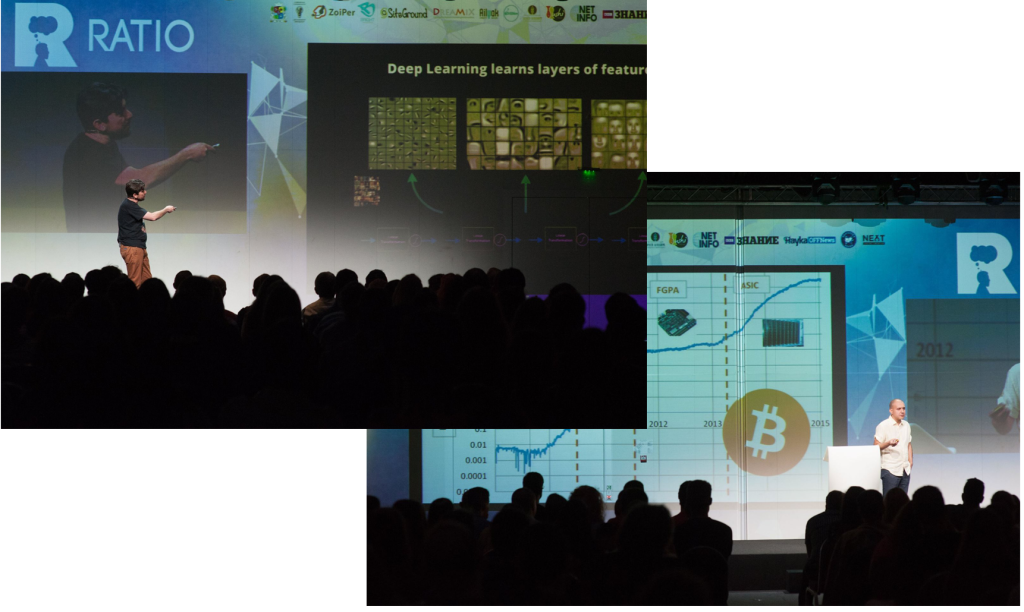
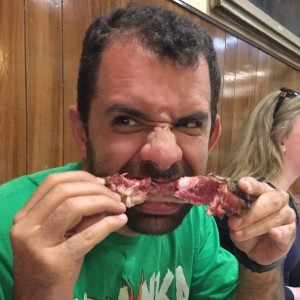
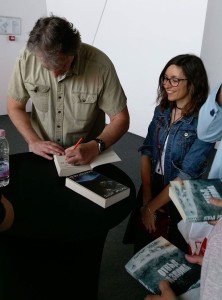
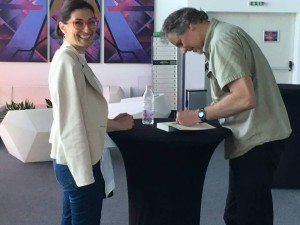
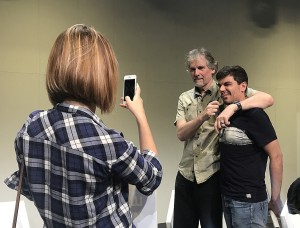
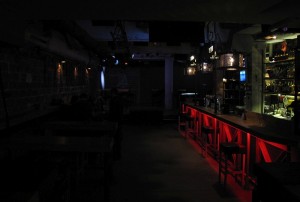
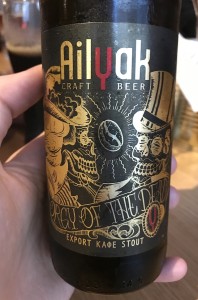

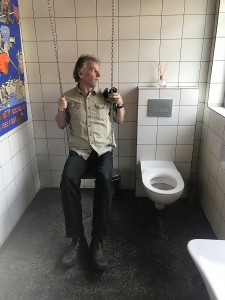
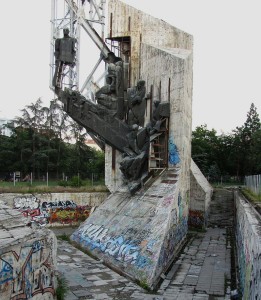
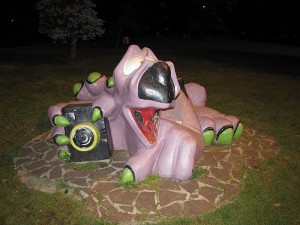

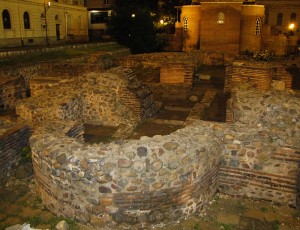

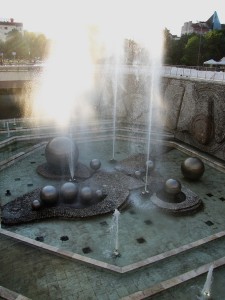
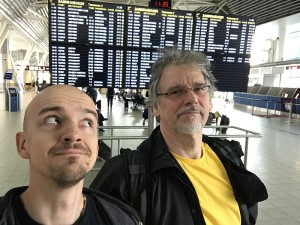








Sofia used to be known for a wonderful and inexpensive Merlot sold in the LCBO in the early 90’s…for $4.99/bottle. I’ve always wanted to visit the area specifically to sup the wine, and your description and pictures now give me a myriad more reasons. Thanks.
Also known as the “George Lucas Theory”. Gotta love language barriers.
(Psst!, I’m pretty sure it’s Vassilena; not Vasselina)
I think your author photo should be the one next to it. Kinda messianic. L. Ron Watts. You could worship magic crystals, deep in the sea.
Yeah, I always get that wrong. I keep thinking of the petroleum jelly. Fixed now. Thanks.
You do know what happens to people who mock cult leaders. Cult leaders have notoriously poor senses of humor.
Is that a vintage Timex Ironman Triathlon? If so, fuck yeah. Takes a licking (with sufficient battery replacements) …
Oh, that marvellous Gwent t-shirt…
Holy shit, that’s a sharp eye you have…
Yes, someone gave it to me. But I’m not allowed to say who.
Also I’ve only played about three games off Gwent so far, but I suck at it. I always win the first round and then lose the others.
Sounded liked you had an awesome time.
Well looks like you had a great time, but I wish your hosts had put out better publicity, at least in English. I live in София, really close to НДК where you obviously gave your talk, and am really sorry I didn’t know this was on. I’d have even gone out and bought “Blindsight” in BG to have you sign it!
BTW, the terminator factory, “1300 of Bulgarian Culture” or something similar, is due to be demolished, although persons unknown have been trying to demolish the demolition machines in order to save this fabulous adornment of Sofia’s artistic heritage…
Simon Robert,
Well, there’s always stuff we can try and do better, though to be fair we don’t have a promotion budget worth mentioning 🙂 We mainly do Facebook event advertising.
Feel free to check out some of the other stuff we’re brewing: https://www.facebook.com/ratio.bg